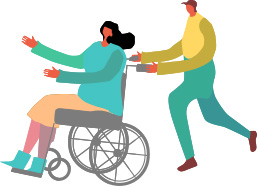Frequently Asked Questions

What’s the difference between a Case Manager and a Specialist Support Coordinator?
Since the introduction of the NDIS, many people have struggled to understand the difference between the role of a Case Manager and a Specialist Support Coordinator.
Believe me, we have struggled with this too!.
So we can only tell you what we see as the difference, having now been providing both services to different client groups.
Traditionally case managers have performed a role similar to that of a ‘project manager’ and have been responsible for bringing together all services working with a person who has sustained an injury or disability to co-ordinate and evaluate a cost-effective plan that encompasses the person’s individual goals.
The Case Management Society of Australia and New Zealand defines Case Management as: “Case management is a process, encompassing a culmination of consecutive collaborative phases that assist clients to access available and relevant resources necessary for the client to attain their identified goals. Key phases within the case management process include: client identification (screening), assessment, stratifying risk, planning, implementation (care coordination), monitoring, transitioning and evaluation. Within the case management process the Case Manager navigates each phase of the case management process (as applicable) with careful consideration of the client’s individual, diverse and special needs, including aspirations, choices, expectations, motivations, preferences and values, and available resources, services and supports. Despite the validity of the modern argument that the use of the term “Case Manager” is outdated and implies that clients are “cases” to be “managed” the term “Case Manager” continues to be an internationally accepted title to identify individuals who engage in the role or function of facilitating the case management process”.
From our perspective the NDIS expects the SSC role to only be allocated to individuals with complex health situations and that this role is to be temporary as the NDIS focuses heavily on empowering individuals to manage their own supports and the incorporation of ‘natural supports’ (family and friends) in a person’s life.
Ultimately the SSC is expected to educate and empower the participant of the NDIS to take on the responsibility of ultimately managing their own services. The NDIS also do not expect the SSC to act as an advocate for the participant and a separate advocacy service should be sought if this service is required.
Many of our private clients however don’t want to take on a case management role as they find it time-consuming and tiresome and would rather spend their time on activities that are more meaningful and enjoyable. Others simply do not have the cognitive capacity to take on the role, nor do they have family or friends that can help. In these cases, the ‘case management’ role can be long-term and episodic, based on the persons need. Many of our private clients have utilized professional case management services for over 30 years.
If you have SSC funded in your NDIS plan it is important to know that the goal of the NDIS is to ultimately empower you to manage your own plan and resources.
It’s also important to know that Case Management or Specialist Support Coordination services can only be provided by a person with a tertiary qualification.
What do I do if I want to provide feedback or I have a complaint?
Lighthouse Health Group and Lighthouse Health Group WA would love to hear from you.
We are committed to addressing any problems as they arise so we can either fix them or clarify expectations. You will be treated with respect and included in the process. Complaints are dealt with separately from any other service we might be providing you with and will not appear anywhere on our participant notes to ensure your privacy.
If you have a complaint click here to be taken to our complaints process or call our offices for guidance.
What do I do if I want to change service providers?
We know that sometimes things go wrong or that it can be identified that we are not the best fit for a service …
Do not hesitate to tell us. If we can’t fix something to your satisfaction we will help you identify a more suitable provider and assist with that transition. We will also consult with you about how much help you might want or need to make the process as painless as possible.
Is it a good idea to receive all services from one provider?
Lighthouse Health Group staff welcome the opportunity to work with other providers of your choice ….
If we can provide you with more than one service we will let you know, but it is entirely up to you who you choose. Lighthouse Health Group staff can help you find other providers based on our own professional connections and whilst we are not allowed to recommend specific providers – we can give you some names to enable you to make your own choice.
Receiving services from one provider is sometimes beneficial if the person does not want to have multiple organisations to liaise with. We find this choice is very much an individual preference.
Does Lighthouse Health Group WA have clearance to prison or experience in the justice system?
Yes, Lighthouse Health Group WA has clearance to work in the prison system and has been providing services and supports to participants transitioning in or out of the justice system for many years.

